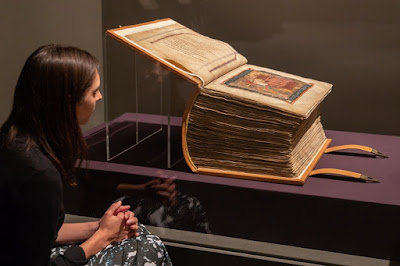 |
| Codex Amiatinus, the earliest surviving complete Christian Bible in Latin. Photo: British Library Board |
There are four original manuscripts containing poetry in Old English—the now-defunct language of the medieval Anglo-Saxons—that have survived to the present day. No more, no less. They are: the Vercelli Book, which contains six poems, including the hallucinatory “Dream of the Rood”; the Junius Manuscript, which comprises four long religious poems; the Exeter Book, crammed with riddles and elegies; and the Beowulf Manuscript, whose name says it all. There is no way of knowing how many more poetic codices (the special term for these books) might have existed once upon a time, but have since been destroyed.
Until last week, I had seen two of these manuscripts in person and turned the pages of one. But then I visited “Anglo-Saxon Kingdoms: Art, Word, War,” a new show of artifacts at the British Library in London. It’s a vast exhibition, covering the art, literature, and history of the people whose kingdoms spread across Britain between the sixth and the eleventh centuries. The impetus for the show came from the library’s 2012 acquisition of the St Cuthbert Gospel, the “earliest intact European book,” in the words of the show’s catalog...
In 2018, we are in a much more elaborate and abstracted phase of Benjamin’s reproduction theory. We are accustomed to reading without reference to any physical object specific to the act of reading. We might have a romantic association with libraries, or prefer to turn real pages rather than electronic ones, but those are tastes borne of nostalgia. They have no real meaning for our experience of literature’s power.
This is why the reunion of the Old English poetic codices is so overwhelming. We have no mental equipment—or, at best, a very rusty apparatus—to process the existence of a physical original. Even our encounters with paintings in a museum are ultimately filtered through mass media and the devices with which we read the written word. It is difficult even to summon in our minds the circumstances of Benjamin’s 1936 essay; the technology has simply moved too quickly.
Read more...
Source: The New Republic










